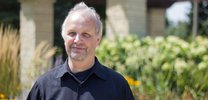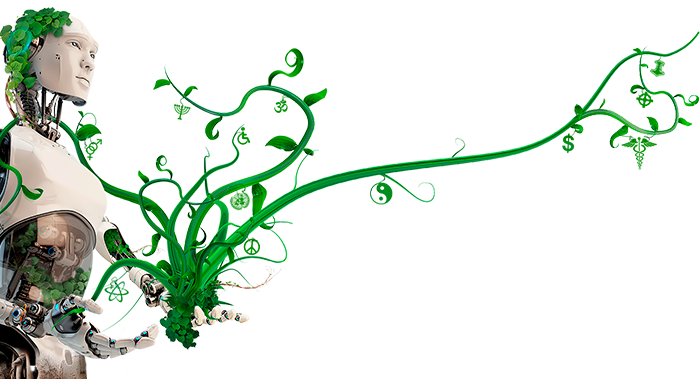live event based on live contributions

Simon Balle is a Ph.D. student at the Department for Theology, School of Culture and Society, Aarhus University. He earned his master’s degree for a dissertation on “Our new neighbor – a theological Løgstrup-inspired ethics for social robotics.” He is now working on a theology for AI and social robotics.

Charles M. Ess, (PhD, Pennsylvania State University, USA) is Professor in Media Studies, Department of Media and Communication, University of Oslo. He works across the intersections of philosophy, computing, applied ethics, comparative philosophy and religious studies, and media studies, with emphases on research ethics, Digital Religion, virtue ethics, and existential media studies. Ess has published extensively on culturally-variable approaches to Information and Computing Ethics, and their applications in everyday digital media technologies, social robots and AI. Ess is an ethics advisor and/or co-researcher in social robotics projects. His Digital Media Ethics, 3rd edition, was published in early 2020.
In the wake of the robot revolution, social robots will eventually find their way into religious contexts. Indeed, some have already done so. Recently ‘Mindar’, the android version of the Buddhist deity Kannon Bodhisattva, has been introduced in a Buddhist Temple in Kyoto; a humanoid designed as Ibn Sina has probed Islamic attitudes to robots in the UAE; and Catholic and Protestant contexts have seen such inventions as SanTO and Bless-U2 respectively. As roboticists start to produce ‘theomorphic robots’ to represent and mediate the divine, there is an urgent need to include scholars of diverse religious traditions in the debate.

Gabriele Trovato is currently Assistant Professor in Waseda University, Tokyo, Japan, and Visiting Researcher in the Pontifical Catholic University of Peru (PUCP). He received his M.S. degree in Computer Engineering from the University of Pisa, Italy, and Ph.D. degree in Biorobotics in Waseda University. Gabriele Trovato has worked in the video game industry, being involved in the development of the world-wide notorious game "Sid Meier's Civilization" and having created popular innovative mods for the game. His main research interests include Human-Robot Interaction, with focus on culture related aspects, artificial emotions in humanoids, robot aesthetics, and Procedural Content Generation.
Religion and science are typically seen as far apart worlds. As a matter of fact, this is not true, as religion also has evolved thanks to new technologies, and robots in particular are objects that have been related to the sacred since ancient times. Recently, new interest is growing worldwide on this topic: however, even new creation of robots for the religious domain have to face the attitude of users of different cultures, which trace back to the mindset present in the background religions, and their concept of human.

Gereon Kopf received his Ph.D. from Temple University (1996). He is affiliated with Luther College, the University of Iceland, and Tōyō University. Sponsored by the Japan Foundation and the Japan Society for the Promotion of Science, he visited Ōbirin University (1993-1994) and Nanzan University (2002-2004). He taught at Hong Kong University (2008-2009) and at Saitama University (2013), authored Beyond Personal Identity (2001), and edited of Merleau-Ponty and Buddhism (2009) and the Dao Companion to Japanese Buddhist Philosophy (2019). He edits the Journal of Buddhist Philosophy and currently develops a "multi-entry philosophy," a new conception of consciousness, and a non-essentialist ethics.
The temple Kōdaij made history when its priest enshrined the robot Mindar as a personification of Kannon Bodhisattva. Since Mahāyāna Buddhist texts typically reject any form of dualism between the divine and the secular implied by monotheism and even claim that “insentient beings are buddha-nature” and “insentient beings become buddhas,” Gabriele Trovato’s term “theomorphic” may not apply in this case. This paper will explore if humanoid robots can be thought of as conscious, deserving of person rights, and even divine in a Buddhist context. What are the practical and ethical implications of the possible Buddhist claim “all humanoids have Buddha-nature”?

Diana Löffler is post-doc at the “Ubiquitous Design” group at the University of Siegen, Germany. She has a background in psychology and holds a PhD in human-computer interaction. Her work focusses on theoretical and practical aspects of designing an appropriate interaction paradigm for human-autonomous system-interaction, when human wellbeing ought to remain an important outcome of technology use.
Marc Hassenzahl is Professor for “Ubiquitous Design” in the Business Information Systems at the University of Siegen, Germany. With his group of designers and psychologists, he explores the theory and practice of designing pleasurable, meaningful and transforming interactive technologies.
Due to their potential proactivity, reduced predictability, lack of transparency, and appearance, robots are perceived as hybrids between ‘things’ and ‘beings’ – as technologically ‘other’. To design these systems in a meaningful way, we discuss the approach of robot ‘superpowers’, social capabilities that are rooted in their ‘thingness’ rather than ‘beingness’. For example, robots have endless patience, are non-judgmental and customizable - qualities that are difficult or impossible to realize for fellow humans. By exploiting these capabilities, robots could potentially be designed as novel and complementary, instead of substituting, ‘species’ that offers new forms of social interaction in religious contexts.

Nardine Alnemr is a PhD candidate at the Centre for Deliberative Democracy and Global Governance, University of Canberra. She researches the interaction of algorithms in online communication with deliberative democracy. Her research interest also includes internet governance and digital rights.
An interesting starting point for public deliberation on the inclusion of social robots is the naturalization of Sophia the robot as a citizen of Saudi Arabia. On an Egyptian TV show dedicated to taking Sunni Islamic advice on matters of life, the host introduces the naturalization of Sophie and asks proactively: “Would Sophia count as one of four marriages or it would not count as marriage?” This paper aims to interrogate this episode of the show and how these religious reasons have been reflected upon elsewhere in public deliberation about social robots’ position in the Middle East. |

Ilona Nord, born 1966, is since 2015 Ordinary Professor for Religious Education, Institute of Evangelical Theology at the Faculty of Humanities of Würzburg University, Germany. After Studies of Theology and Communication Science (BA) she did her PhD in Systematic Theology/Ethics at Frankfurt University and her Habilitation on “Die virtuelle Dimension des Glaubens” (The virtual dimension of faith) in the field of Practical Theology. She was a Minister in Evangelische Riedberggemeinde in Frankfurt am Main during 2006-2010 (Evangelische Kirche in Hessen und Nassau) and worked in Public Relations at Gemeinschaftswerk für Ev. Publizistik (1999-2001). She currently leads a networking group of german spoken Practical Theologians on Transformations in Religions and digital Communication (Wissenschaftliche Gesellschaft für Theologie). Research projects RELab digital and Coteach (BMBF) on religious education in digitized worlds.

Thomas Schlag, born 1965, is since 2011 Ordinary Professor for Practical Theology (Religious Education, Church Theory, and Pastoral Theology) at the Faculty of Theology and Head of the Center for Church Development (ZKE) at the University of Zurich in Switzerland. After studies of Theology and Political Science in Tuebingen and Munich he did his PhD in Ethics and his Habilitation on the field of religious and political didactics. He also served a Minister in the Evangelische Landeskirche in Wuerttemberg between 1996 and 2004 and was Director of studies at the Evangelische Akademie Bad Boll in the field of Youth, Citizenship and Education. He currently leads an interdisciplinary research group “Digital Religion(s)” at the University of Zurich. Connected to this his other research fields are digitalization and theological communication practice; perspectives of "Public Theology" and "Public Church" between church, state and civil society, and analyses and interpretations of Religious Education practice in schools and churches.
In 2017, the Protestant Church in Germany presented the robot priest “BlessU2” to the participants of the Deutscher Kirchentag in Wittenberg. This generated a number of important questions on key themes of religion(s) in digital societies: Are robots legitimized and authorized to pronounce blessings on humans – and why? To answer such questions, one must first define the interrelationship of technology, religion and the human being. Paul Tillich (1886-1965) referred to the polarization of autonomy and heteronomy by raising the issue of theonomy: the first step on the way to critical research on representing the divine in robotic technology.

Charles M. Ess, (PhD, Pennsylvania State University, USA) is Professor in Media Studies, Department of Media and Communication, University of Oslo. He works across the intersections of philosophy, computing, applied ethics, comparative philosophy and religious studies, and media studies, with emphases on research ethics, Digital Religion, virtue ethics, and existential media studies. Ess has published extensively on culturally-variable approaches to Information and Computing Ethics, and their applications in everyday digital media technologies, social robots and AI. Ess is an ethics advisor and/or co-researcher in social robotics projects. His Digital Media Ethics, 3rd edition, was published in early 2020.
The computational turn leads to a robo-philosophy that uses computational and robotic technologies as testbeds for philosophical questions such as the nature of being human. Robo-theology extends these approaches and interests via religious robots that further evoke questions of the mind-body, Creator-creation, and faith-reason relationships. As part of a recent agenda for non-dualistic approaches in robo-theology, Scandinavian Creation Theology (SCT) contributes a more optimistic conception of human nature and correlative non-dualistic accounts that more fully resonate with Eastern approaches. SCT is further fruitful for central issues in robo-theology such as distributed ethical agency and responsibility, love, sex, and trust.
